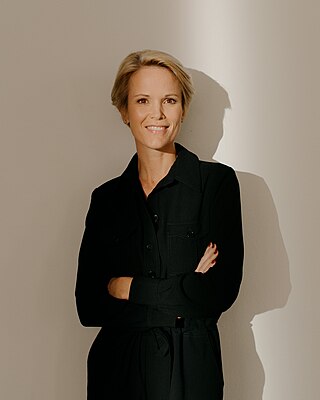Grading in education is the application of standardized measurements to evaluate different levels of student achievement in a course. Grades can be expressed as letters, as a range, percentages, or as numbers out of a possible total. The exact system that is used varies worldwide.

Janosch is a German children's author and illustrator.

Neue Schule Hamburg is a private Sudbury school in Rahlstedt, Hamburg, Germany, established in 2007.
Education in Hamburg covers the whole spectrum from kindergarten, primary education, secondary education, and higher education in Hamburg. The German states are primarily responsible for the educational system in Germany, and therefore the Behörde für Schule und Berufsbildung is the administrative agency in Hamburg. The Behörde für Wissenschaft und Forschung has the oversight for universities and colleges.

Richard David Precht is a German philosopher and author of successful popular science books about philosophical issues. He hosts the TV show "Precht" on ZDF.

Christoph Wulf is a German professor of Anthropology and Education at the Free University of Berlin.

Stephanie Anna Charlotte Buhl-Freifrau von und zu Guttenberg is a German activist, public speaker, entrepreneur and author in the field of child abuse and internet education for children and adolescents. She was the former president of the German section of Innocence in Danger and is married to the former German Minister of Defence, Karl-Theodor zu Guttenberg since 2000 although separated since 2023.
Józef Stala is a Polish Catholic priest, theologian, and philosopher. He was ordained on May 25, 1991.
Hans Karl Peterlini is an author, journalist, Austrian university professor and educational researcher originally from South Tyrol, an autonomous, mostly German speaking province in Northern Italy.

Alfons Rissberger is a German entrepreneur, business consultant, and writer.
Thomas Knaus is a German educational scientist. He is a Professor of Educational Science specializing in Media Education and Head of Department of Media Pedagogy. at The Ludwigsburg University of Education and Honorary Professor for Educational Informatics at the Faculty of Computer Science & Engineering at the Frankfurt University of Applied Sciences. He also work as an Academic Director of the FTzM in Frankfurt am Main. He served as professor of Pedagogy at the University of Erlangen-Nuremberg as well as a visiting professor at the University of Otago, at the University of Sydney (Australia) and at the University of Vienna (Austria). Before his academic career Knaus worked as a teacher and a media educator in extracurricular youth work in Frankfurt am Main and Bad Homburg.

Arno Stern was a German-born French pedagogue and researcher.

Gerald Hüther is a German neurobiologist and author of popular science books and other writings.

Manfred Spitzer is a German neuroscientist, psychiatrist and author.

The (Allgemeine) Schulpflicht is a statutory regulation in Germany that obliges children and adolescents up to a certain age to attend a school. The Schulpflicht includes not only regular and punctual school attendance, but also participation in lessons and other school events, as well as doing homework.

Margret Rasfeld is a German author, activist and headmistress in active retirement. She is the co-founder and current managing director of the initiative Schule im Aufbruch and has been elected Ashoka Fellow since 2015. Rasfeld advocates a reorientation of school education according to the guidelines of the UNESCO campaign Education for sustainable development (ESD).

Gerald Lembke is a German business economist with focus on digital media and an author of non-fiction.

Siegmund Helms is a German musicologist and music educator.

Wilfried Gruhn is a German music educator, musicologist, violinist, and professor emeritus at universities in Germany and abroad. His focus is the music education of small children. He founded and directed the Gordon Institute of early childhood music learning in Freiburg in 2003. He is engaged in several international organisations such as International Society for Music Education (ISME) and the Internationale Leo Kestenberg Gesellschaft which published Leo Kestenberg's complete writings in six volumes.
Rebeca Wild was a German educator and author in Ecuador.














